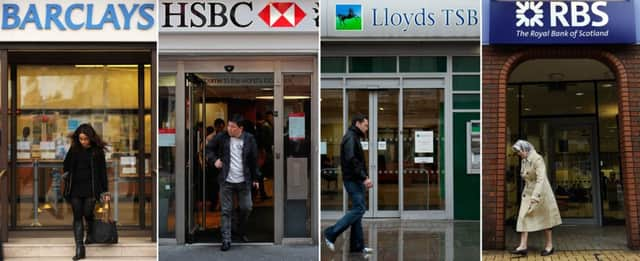Big banks face threat of full-scale inquiry over competition


Barclays, HSBC, Lloyds Banking Group and Royal Bank of Scotland have been given a grace period by the Competition and Markets Authority (CMA) to come up with their own solutions before an inquiry is launched in the autumn.
Scottish-headquartered banks Lloyds Banking Group, which owns Bank of Scotland, and the Royal Bank of Scotland are the biggest banks in the market for both current accounts and small business banking, and are believed to be most at risk of being told to cut their market share, potentially by selling more branches.
Advertisement
Hide AdAdvertisement
Hide AdPoliticians have made repeated calls for “challenger banks” to help open up the market.
The CMA said it had found that “essential parts of the UK retail banking sector lack effective competition and do not meet the needs of personal consumers or small and medium-sized enterprises”.
CMA chief executive Alex Chisholm said: “Competitive personal and SME banking markets are essential to households and businesses throughout the country, and to the success of the UK economy. “However, our studies have found that, despite some positive developments, significant competition concerns remain which mean that customers may not be getting consistently good service and value from their banks.
“Our provisional view is that a full market investigation by an independent expert CMA group is necessary to look at this market in detail and identify appropriate measures if competition concerns are found.”
It follows two studies in collaboration with City watchdog the Financial Conduct Authority (FCA) into the £8 billion personal current account market and the £2bn SME current account and lending sector.
The CMA found that concerns remained about competition not effectively serving customers despite measures to make authorising new banks simpler and faster, to make account switching easier and to improve transparency. It found that it was still too hard for newer and smaller banks to enter the market or expand, with much business remained concentrated in the hands of a few.
Consumer groups welcomed the news, saying a shake-up of the market would provide a better service for customers.
David Mann, head of money at uSwitch.com, said: “This is potentially great news for anyone who has a bank account. The CMA has the clout to fix the broken banking industry once and for all, and lay the foundations for a competitive market that works for, rather than against, customers.”
Advertisement
Hide AdAdvertisement
Hide AdRichard Lloyd, Which? executive director, said: “For too long customers have been getting a raw deal from the biggest high street banks, so a full inquiry into the current account market is welcome if long overdue.
“The CMA must now get to the bottom of why this market is not working for consumers, but the banks should not waste any time in making changes to put the interests of their customers first.”
There was “very little movement” in the market share of the largest banks – other than as a result of mergers and acquisitions, the CMA said – and many customers saw little difference between the largest banks in the services they offered.
Challengers such as Tesco, the Post Office and M&S have all launched current accounts in the last year, but have not so far proved to be viable competitors to the main players.
Charlotte Webster, campaign manager of Move Your Money, called for more new banks to enter the sector. “We’ve been saying this for years,” she said. “Simply, people want real alternatives. This is something the big banks would have you believe don’t exist, but they do. Whilst millions have switched banks in the last year, there are many parallels between energy and banking. We should be seeing a switch from the big five to the big 500.”